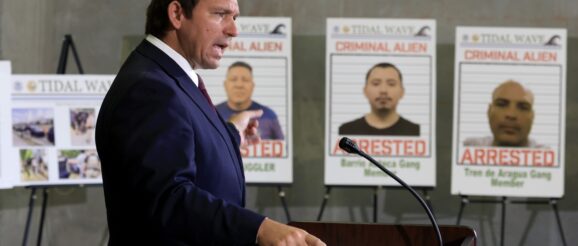Many immigrants say they have new rules for driving

Outside an evangelical church on the outskirts of Tampa, Fla., half a dozen immigrant families wait in the sweltering Sunday heat. The men wear bright, colorful shirts while the women are dressed in traditional Guatemalan embroidered clothing. The service has ended, but no one is rushing to their cars. Instead, they wait for rides home.
That has led to new, unwritten rules of the road.
Ambrocio’s father, the pastor at this church, was recently deported to Guatemala, after 30 years living in the U.S. He didn’t have a criminal record.
His daughter says everyone out here, regardless of immigration status, is on edge. Everyone standing outside the church says they know someone who has been stopped recently by Florida Highway Patrol and is now facing deportation.
A lawsuit filed in connection with recent ICE raids in Los Angeles is challenging what human rights lawyers allege are racially motivated arrests and detentions by federal agents
at workplaces and during traffic stops. The plaintiffs include day laborers and others who were picked up at bus stops while they were traveling to or from their jobs.
Adam Isaacson, with the noofit human rights group Washington Office on Latin America, believes the Trump administration is trying to normalize the kind of enforcement long seen in border communities. “It’s something that is clearly a goal of this administration, to bring that border vigilance of undocumented immigration to the whole country.”
Isaacson points to the sheer manpower now dedicated to immigration enforcement as proof. “If you add up all of the jurisdictions that deputize local law enforcement, places where National Guard and military now play a supporting role, and all of the regular law enforcement agencies, from DEA to IRS being deputized for this, you’re getting close to 100 thousand people that they can deploy around the country,” he estimates.
Isaacson says the limitations on mobility in immigrant communities will have ripple effects across the nation’s economy. “The upshot is, if people are not able to shop, if people are not able to work… that all drains money out of the economy.”
If traveling locally is becoming complicated for immigrants, interstate travel has gotten even more complicated.
On an Amtrak train from New York City to Southern Florida, an immigrant from Colombia tells me that he was paroled into the U.S. two years ago. In other words, he was granted temporary admission, pending a court hearing. When he first arrived, he lived in a migrant shelter in New York City. Then, he got a work permit and was able to find a job at a farm outside Orlando. His immigration court appointments are in Manhattan, since that was his first place of residency in the U.S.
